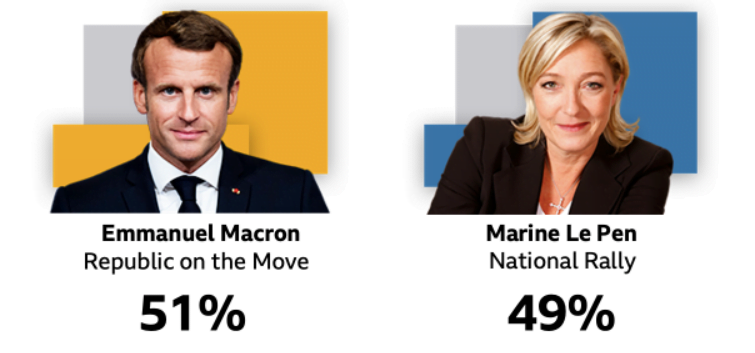Support for far-right candidate Marine Le Pen is increasing as France moves closer to its presidential election on April 24th. Her statements have indicated a dramatic change in French participation in NATO.
“When the extreme right in all its forms represents so much of our country,” complained French President Emmanuel Macron, “we cannot feel that things are going well.”
Macron defeated Le Pen in 2017 just a year after founding a centrist, pro-European political movement called La République En Marche! The victory was a landslide, with Macron winning 66% of the vote compared to Le Pen’s 34%. The race is expected to be much tighter this time around, with polls suggesting the winner could claim victory by as little as 1%.
The first round of voting in this year’s election took place on April 10th and involved 12 candidates. Roughly 73% of eligible voters participated, marking the lowest turnout in 2 decades. Macron earned first place with 27.8% of the vote and Le Pen took second place with 23.2%. Coming in a close third place was far-left candidate Jean-Luc Mélenchon, who earned 22% of the vote.
Macron performed best among voters over the age of 65, while Le Pen attracted the most votes from individuals between the ages of 35 and 64. More than 33% of voters between the ages of 18 and 24 backed Mélenchon and are more likely to vote for Macron than for Le Pen.
After the votes were tallied, Mélenchon told his supporters that under no circumstance should they vote for Le Pen.
“The debate that we will have in the coming 15 days is decisive for our country and for Europe,” said Macron. “I don’t want a France which, having left Europe, would have as its only allies the international populists and xenophobes. That is not us. I want a France faithful to humanism, to the spirit of enlightenment.”
Macron’s comments are clearly a jab at Le Pen, whose nationalist views on immigration, international treaties, and the EU have drawn comparisons to former US President Donald Trump. Indeed, when Le Pen met Russian President Vladimir Putin in 2017, she predicted a “new world order” would emerge with Putin, Donald Trump, and herself at the wheel.
Le Pen has attracted considerably more support this year by putting her far-right goals on the back burner and appealing to supporters with promises to cut taxes amid a period of high inflation and increasing energy costs. But she still wants to loosen ties with the EU, restrict immigration, and ban Islamic headscarves in public.
“The British got rid of the Brussels bureaucracy, which they could never bear, to move to an ambitious project of global Britain,” she said, referring to Brexit. “This is not our project. We want to reform the EU from the inside.” It’s time for a “great changeover,” she continued, and voters must make a choice between “division and disorder, or a union of the French people around guaranteed social justice.”
While Macron has been too preoccupied with matters related to the Russian-Ukrainian war to do much campaigning, Le Pen has had ample time to tour the country and meet with supporters face-to-face. It’s very possible she will attract former Macron supporters who are frustrated with his draconic response to the pandemic and his handling of the yellow vest protests.
In 2017, Macron was seen as an underdog candidate bringing youth and vigor to the French government. Now, he is a sitting president with a mixed record. As has happened in the United States, voters’ opposition to a sitting president could play a major role in the election.
“The widespread dissatisfaction with Macron (especially among the young) means that the outcome is uncertain and unpredictable. Le Pen will continue to exploit this, and a major political upset therefore remains possible,” noted CNN commentator Dominic Thomas. “However much they may dislike Le Pen, there is a world of difference between her and Macron, and how she would disrupt European and global politics.”
Mitigating this advantage is Le Pen’s association with Putin.
Le Pen has long admired the Russian leader and posed for a picture with him during her 2017 campaign. Le Pen condemned Russia’s invasion of Ukraine, but said she wants France to assist Russia in developing a closer relationship with NATO in order to prevent Russia from allying too closely with China.
“As soon as the Russian-Ukrainian war is over and has been settled by a peace treaty, I will call for the implementation of a strategic rapprochement between NATO and Russia,” said Le Pen. “I would place our troops neither under an integrated NATO command nor under a future European command.”
There’s also the fact that Le Pen’s political party – renamed from Front National to National Rally – borrowed more than $9 million from a Russian bank in 2017 and has yet to pay it off.
Le Pen described accusations that her party was indebted to Moscow as “inaccurate” and “unjust;” however, her security team tackled an audience member at a recent political rally after she held up a heat-shaped sign featuring a photo of Le Pen and Putin shaking hands.
“[President Macron] will be vulnerable on a range of domestic issues, but she [Le Pen] will have difficulty convincing the electorate of her foreign policy credentials, especially given her longstanding links with Russia,” added Thomas.
If Macron wins on April 24th, he will be the first French president to get re-elected since Jacques Chirac defeated Le Pen’s father, far-right candidate Jean-Marie Le Pen, in 2002. Macron and Le Pen will participate in a televised debate on April 20th.
Sources:
Emmanuel Macron to face Marine Le Pen in French presidential election runoff
Macron Has Slight Lead Over Le Pen After First Round
French elections: Macron and Le Pen to fight for presidency
Marine Le Pen proposes closer NATO-Russia ties after Ukraine war
